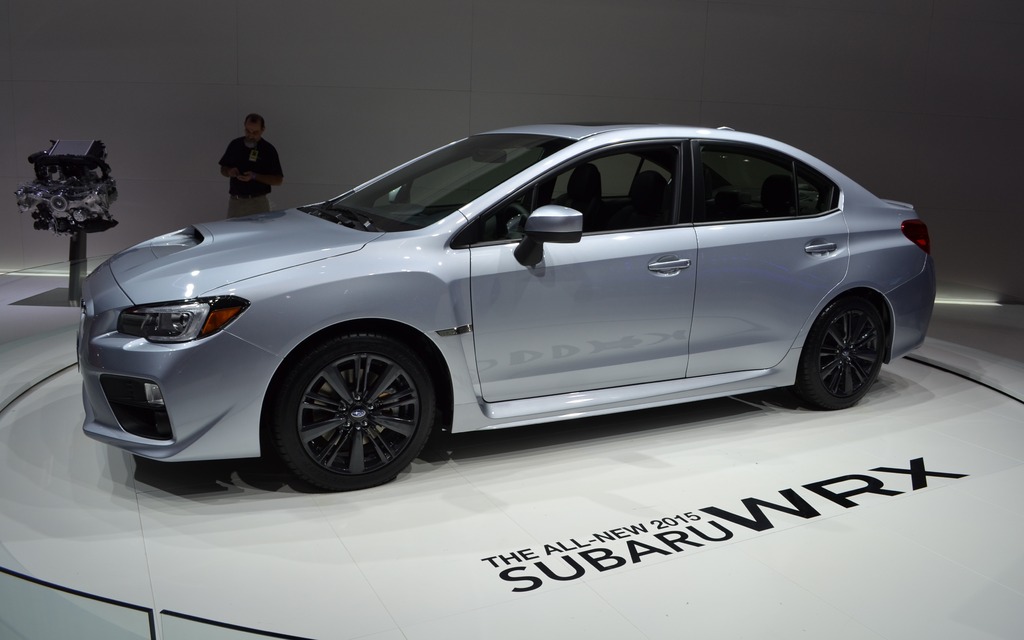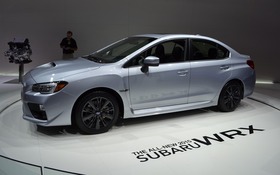2015 Subaru WRX: Made for the People
Subaru chose the Los Angeles Auto Show to unveil the new generation of the WRX, a 2015 model that compact sports car lovers have long been awaiting. Every new generation of the WRX is carefully examined under the microscope by fans, and that’s why this latest vintage has garnered so much attention at the show. Reactions have been mixed, but are generally positive, which bodes well for the car.
The first thing you need to know is that this year’s model hasn’t just evolved, it has been entirely revamped. Subaru wanted to preserve its dynamic character while making the vehicle more attractive, so that they could draw in more customers. This proved to be quite the challenge, as you always run the risk of disappointing purists when you aim to please a larger audience.
The new WRX rests on an all-new chassis, based in part on the Impreza’s platform, but also reinforced to support the car’s extra power. Other changes include an improved suspension, stretched wheelbase (by 25 mm to make the vehicle more spacious) and the addition of an electrically assisted power steering for enhanced control.
No family hatchback
A few photos of the WRX were leaked prior to the launch, and not everyone was thrilled with its design. But in real life, I found the car a lot nicer than in the pictures – and several of the people I talked to agreed. As is often the case, photos simply don’t do it justice. The front end is especially well executed thanks to its more aggressive aura and trapezoid grille, not to mention the classic WRX integrated air intake in the hood. There are also new wheels and LED lights in the rear tail lights and front headlamps.
The rear section is more sober and demure, especially with its tiny spoiler on the edge of the trunk. Fortunately, it gets a boost from the quadruple exhaust – two on each side – and the diffuser integrated under the bumper.
The real disappointment for Canadians is that, for the time being, the WRX is only being offered as a four-door sedan. There is no five-door wagon in the catalogue, despite the fact that this configuration is very popular in Canada. According to Subaru, the decision was the result of technical constraints and there’s a chance we could see a five-door version in the future.
New mechanics
Under the hood, the old 2.5L four-cylinder turbo has been replaced with a brand-new 2.0L that develops 268 horsepower, which is three more ponies than the previous engine, thanks mostly to direct injection technology. Another improvement: top power is reached at a lower gear, 5,600 rpm instead of 6,000. Torque is also up from 244 to 258 lbs.-ft., and it reaches its peak more quickly than before.
The new generation addresses one of the main critiques of this car. The manual gearbox has gained one speed and now offers six instead of five. This will definitely make some people happy! It will probably help improve fuel economy too, while making better use of the available power.
The other big-ticket item is the new CVT. This move is clearly an attempt to charm the average driver who isn’t necessarily a big fan of manual gearboxes. The WRX can be equipped with the Lineartronic CVT, which is based on the Forester’s transmission, but with a more sporty approach according to Subaru. We’ll be interested in testing this out for ourselves, however, because CVT and sport handling rarely go together. That said, we totally understand why Subaru decided to offer it – purists can always opt for the manual.
The interior was reconfigured, but not to the point of being unrecognizable. The layout is much the same; it’s just more modern. We liked the carbon fibre accents, the metal pedals and the D-shaped sport steering wheel that is very comfortable to hold. The addition of softer materials adds to the overall quality, which was a bit lacking in the previous generation.
It goes without saying that the WRX STI will be based on this WRX. With all the changes that were made to the vehicle, it will be interesting to see what Subaru has kept up its sleeve for the STI.












